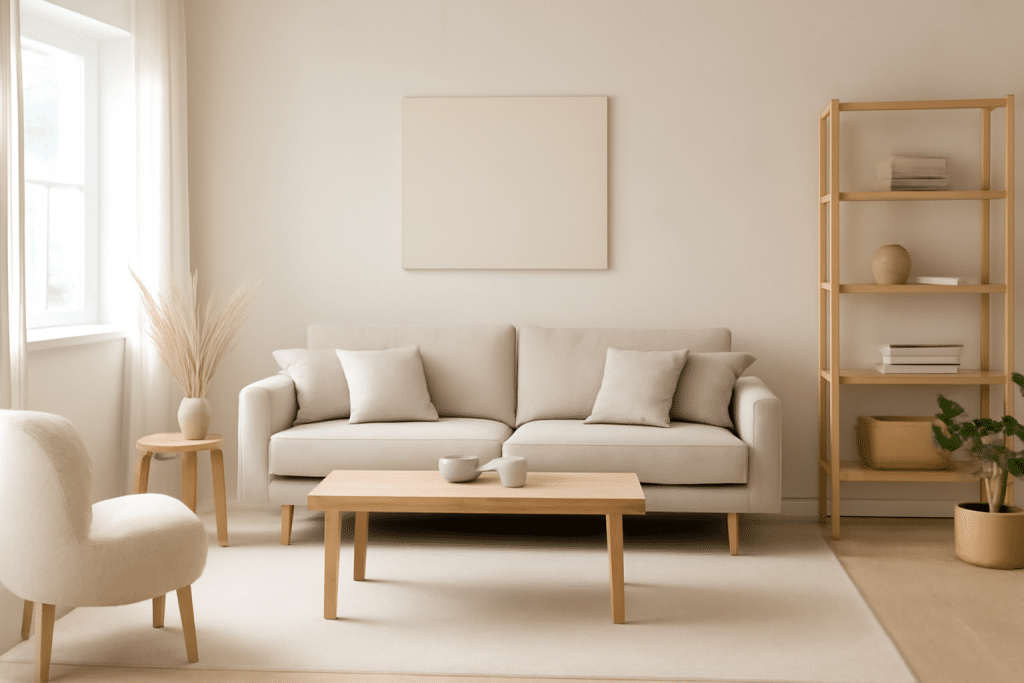In a world constantly buzzing with distractions, living a minimalist lifestyle has become more than just a trend—it’s a powerful tool for improving mental health and productivity. By intentionally simplifying your life and surrounding yourself with only what truly matters, you can experience profound benefits in terms of stress reduction and enhanced focus. Let’s dive deeper into how minimalist living can improve your life, especially in today’s fast-paced society.

What is Minimalism?
Minimalism isn’t just about getting rid of your possessions. It’s about embracing a life where you focus on quality over quantity, and where you only hold on to things that add real value. It’s a lifestyle that encourages intentionality in your choices, whether it’s about your home, your work, or even your relationships. By eliminating excess, minimalism frees up space—both physically and mentally—for what truly matters.
The Link Between Clutter and Stress
Clutter is not just an eyesore; it can have a significant impact on your mental well-being. Studies have shown that clutter can increase cortisol levels—the body’s stress hormone—leading to feelings of anxiety and overwhelm. In fact, a 2016 study published in the Personality and Social Psychology Bulletin found that people with cluttered homes are more likely to report high levels of stress and negative emotions (McMains & Lichstein, 2016).
A cluttered environment can also reduce your ability to focus. When your space is filled with items that serve no real purpose, it can be challenging to concentrate on tasks that require attention and energy. In contrast, a minimalist living space can lead to better mental clarity, as it removes distractions and helps foster a calm environment.
How Minimalist Living Reduces Stress
- Decluttered Spaces Promote Calmness
The most immediate benefit of minimalism is the reduction of physical clutter. When your environment is clean, organized, and free of unnecessary objects, it fosters a sense of tranquility. A minimalist home, with its open spaces and simple decor, creates a peaceful sanctuary that encourages relaxation and reduces mental strain.
Research from the Princeton University Neuroscience Institute supports this idea, showing that physical clutter in one’s environment can reduce the brain’s ability to focus and process information (Chrysikou et al., 2013). By minimizing distractions, a minimalist environment allows your brain to focus on what’s important, reducing the cognitive load and decreasing stress levels.
- More Time for What Matters
Minimalism encourages prioritizing activities and possessions that align with your values. By simplifying your schedule and reducing unnecessary commitments, you create more time to focus on what truly brings you joy, fulfillment, and relaxation. This can significantly reduce the stress of feeling overwhelmed by your daily responsibilities. Whether it’s spending quality time with loved ones, engaging in hobbies, or simply taking time to rest, minimalism helps ensure that your energy is directed toward things that add value to your life.
- Improved Mental Health and Reduced Decision Fatigue
In today’s society, we face a constant barrage of decisions, from what to wear in the morning to what to have for dinner. The more choices you make, the more mental energy you expend. This is known as “decision fatigue,” and it can lead to anxiety and burnout. Minimalism helps reduce decision fatigue by simplifying your choices. With fewer possessions and a less complex daily routine, you can conserve mental energy and focus on decisions that truly matter.
How Minimalist Living Boosts Focus
- Clearer Spaces Lead to Clearer Minds
As mentioned earlier, a cluttered environment can lead to a cluttered mind. When you declutter, you’re not just removing physical objects from your space; you’re also creating mental space. A minimalist lifestyle promotes a clean, organized environment, which enhances cognitive function and sharpens focus. When there are fewer distractions in your surroundings, your brain can channel its energy into the task at hand, leading to greater productivity.
A study published in the Journal of Environmental Psychology found that people who work in organized, clutter-free environments tend to have better concentration and perform tasks more efficiently (Koivisto et al., 2017). In contrast, people surrounded by clutter are more likely to procrastinate and have difficulty focusing on tasks.
- Intentional Living Fosters Deep Work
Minimalism is not just about simplifying the physical environment; it’s about simplifying your entire life. When you live with intention, you can prioritize deep, meaningful work. Instead of being distracted by endless notifications, social media updates, or the urge to multitask, minimalism allows you to engage in “deep work”—uninterrupted, focused work that leads to greater achievements.
Cal Newport, in his book Deep Work: Rules for Focused Success in a Distracted World, argues that the ability to focus deeply and without distractions is one of the most valuable skills in today’s economy. Minimalism, by cutting out distractions, enables you to focus on the work that matters, leading to both professional success and personal fulfillment.
- Less Consumption Equals More Mindfulness
Minimalist living encourages you to consume less, whether it’s material possessions, media, or food. This reduction in consumption allows you to become more mindful of your habits and your environment. By practicing mindfulness, you can enhance your ability to focus and reduce stress. Being mindful helps you live in the present moment, allowing you to make better decisions and avoid the trap of unnecessary distractions.
Mindfulness is linked to a reduction in stress, increased cognitive function, and better emotional regulation (Zeidan et al., 2010). The minimalist lifestyle, with its emphasis on intentional living, complements mindfulness practices by removing distractions and promoting focus.
The Lasting Benefits of Minimalism
While the initial transition to a minimalist lifestyle may be challenging, the long-term benefits are well worth the effort. Over time, you’ll likely experience:
- Lower levels of stress due to a simplified environment and routine.
- Increased mental clarity as distractions are minimized and focus is sharpened.
- A stronger sense of purpose as you align your actions and possessions with your values.
- More time for self-care and activities that promote mental well-being, such as exercise, meditation, and quality time with loved ones.
Conclusion
Minimalist living isn’t just a trend—it’s a way of life that can significantly reduce stress and boost focus. By decluttering your physical and mental space, you create an environment that fosters peace, clarity, and productivity. Embracing a minimalist lifestyle encourages intentional living, reduces decision fatigue, and helps you focus on what truly matters. If you’re looking to improve your well-being, reducing clutter and simplifying your life might just be the key.
References:
- Chrysikou, E. G., et al. (2013). “The effects of clutter on cognitive performance and stress levels.” Princeton University Neuroscience Institute. Available at: https://www.princeton.edu (Accessed: 6 August 2025).
- Koivisto, J., et al. (2017). “The impact of office clutter on workplace performance.” Journal of Environmental Psychology. Available at: https://www.journals.elsevier.com (Accessed: 6 August 2025).
- McMains, S. A., & Lichstein, K. L. (2016). “Clutter and its effect on stress levels.” Personality and Social Psychology Bulletin, 42(11), 1565-1578. Available at: https://journals.sagepub.com (Accessed: 6 August 2025).









